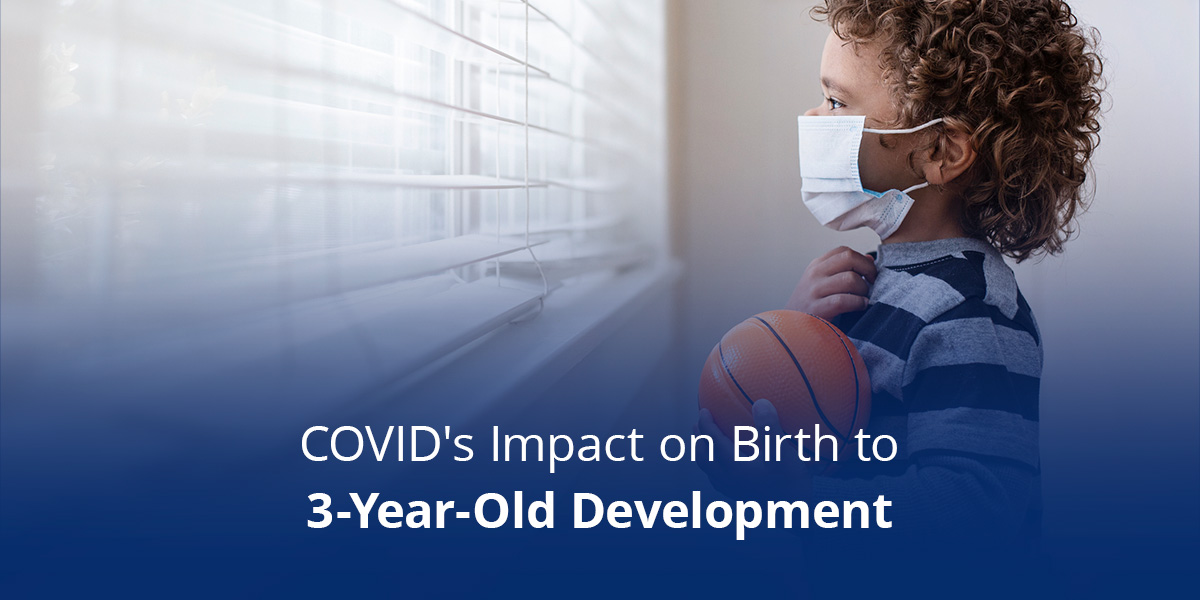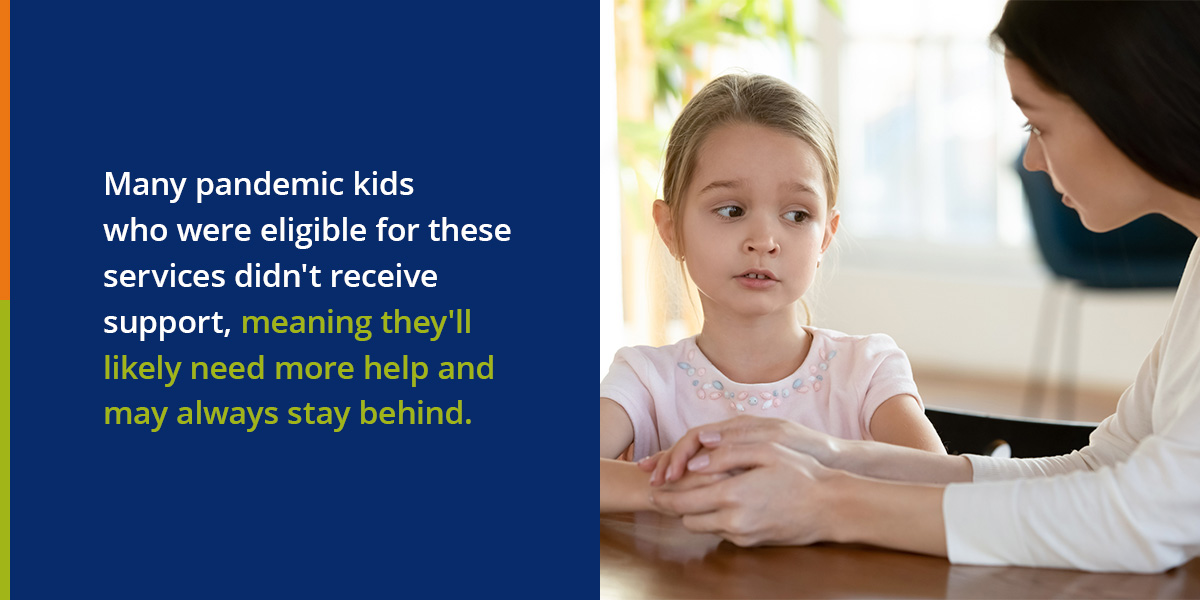
The COVID-19 pandemic has affected nearly every aspect of life, with more profound impacts on young children than many parents and caregivers may realize. COVID-related stress and isolation have led to decreased socialization and language skills, increased anxiety and behavioral issues and many other challenges for developing infants and toddlers.
How Has the Pandemic Affected Child Development?
The COVID-19 pandemic caused significant amounts of stress for parents with kids of any age, particularly newborns and toddlers. Social isolation, job loss and school and child care closures exacerbated adverse childhood experiences like neglect, domestic violence and parental substance use and mental illness. ACEs cause high levels of toxic stress for young kids, which can harm their development and cause future health problems.
During the pandemic, parental and caregiver mental wellness impacted newborns’ and toddlers’ physical, emotional and psychological development. For example, it’s challenging for a parent with depression to want to make time for and nurture a child, which can significantly impact the first few years of a child’s life. Babies need caregivers to hold them, play with them and speak to them. Without enough of these positive interactions, a child’s brain won’t develop properly.
How Has the Pandemic Affected Motor Development?
Other pandemic effects on early childhood development include lower motor skills. Compared to 6-month-olds evaluated before the pandemic, babies born during COVID scored lower on developmental screening tests for motor and social skills. At this age, infants should be able to roll from their backs to their stomachs and reach for and grasp objects with both hands. Average gross and fine motor skill scores for infants born during COVID were lower than babies at the same age before the pandemic.
How Has the Pandemic Affected Social Skills?
COVID-19’s impact on child social development is also consequential. Because the pandemic completely altered social lives, babies born during this time had fewer interactions and saw fewer faces due to masking mandates. Additionally, parents kept their infants at home due to shelter-in-place orders, closures and the fear of getting sick. As a result, pandemic babies lacked opportunities to develop valuable social skills.
For example, many places and situations like play dates, day care, preschool and playgrounds were off-limits or closed during the pandemic. These social situations are crucial for babies and toddlers to experience play-based learning. While exploring and interacting with others, young kids acquire skills like sharing, connection, conflict resolution, self-advocacy and communication, among others. Kids born during this period missed these childhood experiences.
Kindergarten Readiness and Future Success
Without the proper opportunities to develop essential social, behavioral and emotional skills and other core competencies, many kids born during the pandemic lack kindergarten readiness. Traditionally, toddlers would enter preschool or pre-K to help them prepare for school and develop the skills to succeed. During the pandemic, enrollment in these programs decreased significantly for the first time in decades.
Many parents and caregivers kept their kids out of pre-K and kindergarten because of COVID-19 concerns. However, research has shown that when kids enter kindergarten late, they’re more likely to remain behind in their academic careers.
Similarly, fewer infants and toddlers with developmental disabilities and delays have received early intervention services since the pandemic started. Under-identification of developmental issues increases the need for support once a child enters the public school system. Many pandemic kids who were eligible for these services didn’t receive support, meaning they’ll likely need more help and may always stay behind.
How to Address the Impact of COVID-19 on Child Development
Since children born during the pandemic are still young, more research is necessary as they grow to determine COVID’s long-term impact on them. One thing is sure, though — the unprecedented stress and hardship have marked the early years of their lives. How can we address the issues of COVID and early childhood development as these children grow?
The best thing to do is to continue supporting families and encourage them to seek help in every way possible. From psychological, occupational, physical and speech therapy to financial assistance, families of kids with developmental delays and disabilities should take advantage of various resources.
More than ever, it is important to support and encourage parents to talk, play and positively interact with their children. Continue to stress the importance of socialization, movement and outdoor time to foster development and continued growth. Giving kids the space and resources to learn necessary skills and progress is crucial for mitigating the pandemic’s developmental impacts.
Additionally identifying developmental issues as early as possible allows children to get the necessary help to reduce the pandemic from continuing to impact their developmental growth. For example, psychological therapy can help kids work through increased anxiety and behavioral issues due to the pandemic. Continued support through the public school system as a child ages can also be highly beneficial for getting them where they need to be.
Register for Child Development and Early Intervention Courses Through Education Resources Inc.
While there’s still more to learn about COVID’s impact on child development, staying educated on child development and early intervention helps you better serve your community and kids. Whether you work in occupational, physical or speech and language services, taking on-demand courses related to child development and early intervention through ERI helps you better prepare to serve this demographic. Find relevant on-demand courses based on your profession or a specific topic and start learning from experts in your field today.


